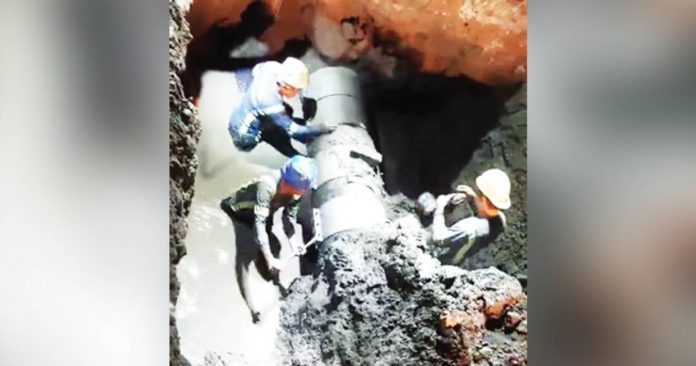
ILOILO City – A weeklong water supply interruption will be experienced in this city and several neighboring towns starting today.
The city’s major water distributor – Metro Pacific Iloilo Water (MPIW), a joint venture of Metro Pacific Water (MPW) and Metro Iloilo Water District (MIWD) – said one of its bulk water suppliers will conduct a plant maintenance; this will result in a supply interruption for a week from 5 a.m. to 11 a.m. and from 5 p.m. to 1 a.m.
Normal operation is expected to resume on April 7.
According to MPIW, they already informed consumers about the plant maintenance activities to be carried out by bulk water supplier Flo Water Resources Inc.
With the weeklong shutdown of Flo Water’s plant, there will be a decrease in supply of 20,000 cubic meters of water per day.
From 5 a.m. to 11 a.m., Jaro north; portion of Mandurriao district; and municipalities of Pavia, Santa Barbara and Leganes will experience limited water supply.
From 5 p.m. to 1 a.m., the districts of Arevalo, City Proper, La Paz, and Molo; Jaro south; and portion of Mandurriao will be affected.
This preventive maintenance activity is also part of the summer action plans of both companies.
Flo Water will also concurrently perform water sampling activities that they need to pass as a prerequisite for continued supply to MPIW.
Meanwhile, in the absence of Flo Water, another MPIW bulk water supplier – Metro Iloilo Bulk Water – will continue to supply 45 to 50 million liters per day to MPIW to be distributed to consumers.
Local government units are requested to coordinate with MPIW regarding water use specifically during cases of fire.
A total of 30 tankers will be mobilized to ease the impact of the maintenance activity, and will be deployed to designated areas.
Jeck Conlu, head of the Public Safety and Transportation Management Office (PSTMO), assured MPIW that their tankers are given clearance during truck ban schedules.
Relative to this, the MPIW laid out measures to ensure continuous water supply for its summer operations.
These measures are being implemented to meet the demand of its 47,250 customers within Iloilo City and seven other municipalities in the province.
“While we continue to work and coordinate closely with our bulk water suppliers on the water production level, we have already put into motion our water supply distribution and augmentation measures to help ensure that our customers will experience continuous water supply during the dry season, where demand normally spikes by 10 to 15 percent due to higher temperatures,” MPIW chief operating officer Robert Cabiles said.
These measures include collaborating with Flo Water Resources and Metro Iloilo Bulk Water for the maximization of their 20 million liter-per-day (MLD) and 50 million liter-per-day (MLD) capacity of their water treatment plants, respectively; and implementation of strategic operational water network management to adjust its operations for an equitable water supply to its customers.
Cabiles mentioned their bulk water suppliers assured him the water level in their water treatment plants and designated reservoirs remain “above the minimum operational level”.
This would mean that with the sustained production of its bulk water suppliers, MPIW has enough water to sustain its customers’ needs throughout the dry months of 2023.
“Our sources are not infinite and have their limits. We need to consider the possibility that once our bulk water suppliers’ water sources reach critical levels, we have to adjust our network, set supply schedule schemes to equally distribute water in our service areas, and install stationary water tanks and roving water tankers,” he added.
On top of this summer action plans, MPIW also pursues aggressive reduction in water losses, or non-revenue water, through the immediate repair of leaks and rehabilitation of pipes. Water losses when recovered can increase the water supply level for distribution to customers.
To date, MPIW’s non-revenue water was reduced to 46.17 percent or equivalent to 34.90 MLD from 56 percent which is 45.55 MLD in four years amidst the lockdowns hampering the operations during the coronavirus pandemic.
The city’s major water distributor is urging everyone to protect our water by reporting leaks and illegal connections, and to use water responsibly and wisely, especially during the dry months when there is more danger of the supply not being enough to meet our demands.
“We have been meeting with DPWH (Department of Public Works and Highways), DENR (Department of Environment and Natural Resources), CDRRMO (City Disaster Risk Reduction and Management Office), and other government agencies and local government units to always find ways to provide our customers with water supply which they can use for their daily requirement after their supply window schedule,” Cabiles said.
With appropriate conservation measures, he said, customers and areas in other parts of the province could enjoy adequate water supply to last for the rest of the year despite the rising summer heat.
Cabiles further affirmed that MPIW supports and collaborates with its partners, MIWD and bulk water suppliers, for the development and implementation of short to long term projects to ensure the sustainability of future water supply.
MPIW has these tips to conserve water:
* Check for plumbing leaks and report pipe leaks to MPIW;
* Use water sparingly such as when brushing teeth and washing hands;
* Use a pail and dipper instead of the shower when bathing or the hose when washing vehicles and gardening during cooler times of the day;
* Reduce the frequency of doing the laundry, and hanging clothes to dry instead of prolonging the washing machine’s spin cycle; and
* Utilize used water for other purposes such as dousing garden plants with water used in food preparation and using soapy laundry water for vehicles.
Cabiles also called on building administrators to limit water supply at certain hours of the day when there are fewer occupants and using recycled water for gardening, cleaning floors, and flushing toilets, among others. (with reports from Alexandra Jover/Iloilo City PIO)/PN




